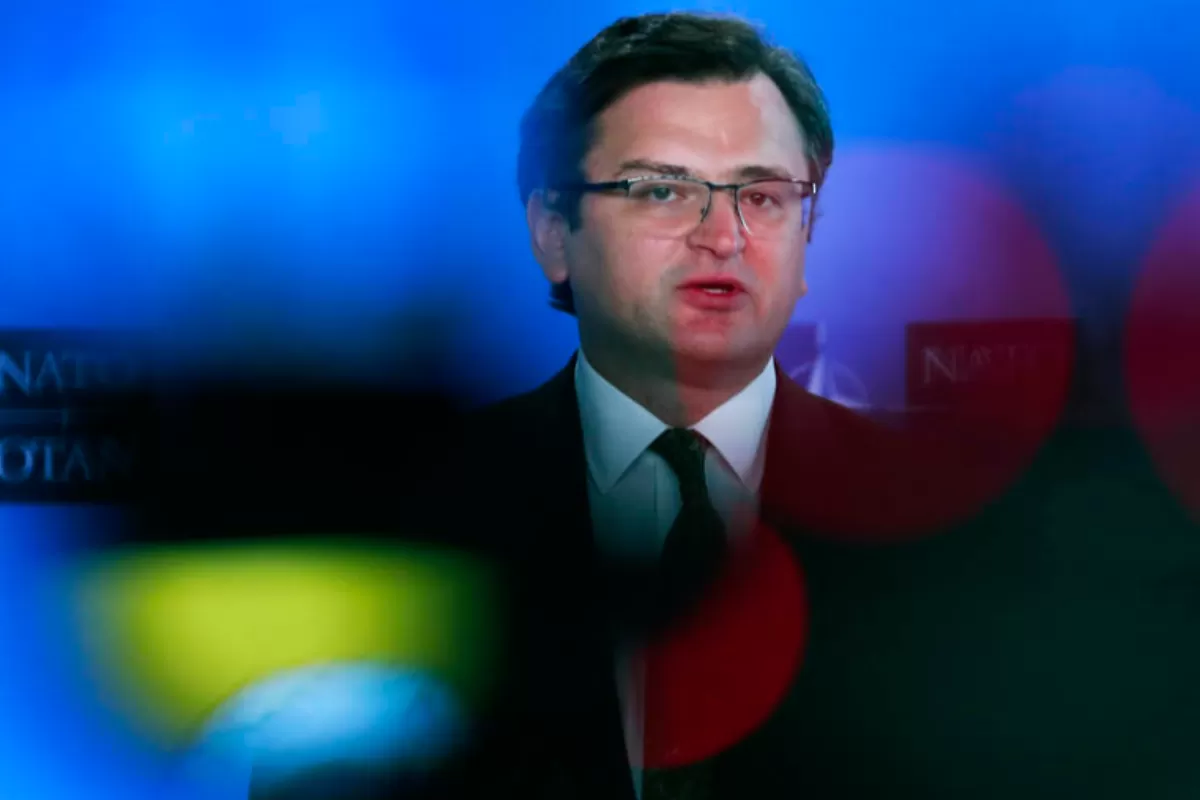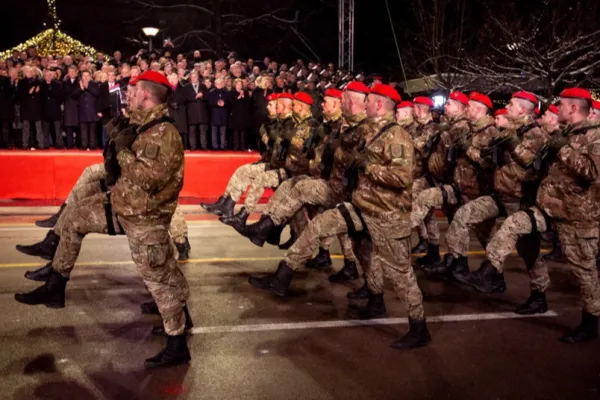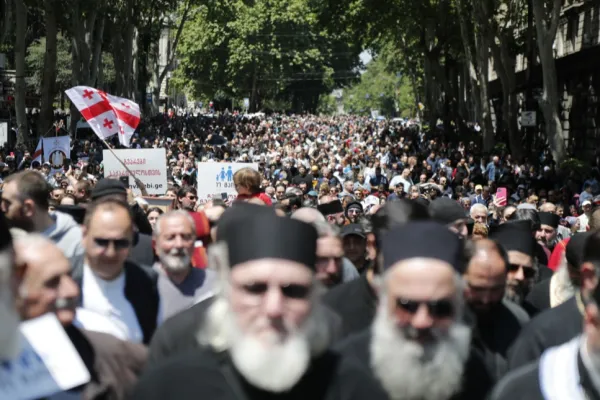Russia continues to rally more and more troops on the Ukrainian border, exceeding the level reported in 2014, the year of the illegal annexation of the Crimean peninsula which eventually triggered the conflict in Donbass. The mobilization is doubled by a massive disinformation campaign depicting Ukraine as the aggressor, killing civilians in Donbass and planning an offensive in the region.
Russia’s military build-up, larger than in 2014
Russian forces amassing close to the Ukrainian border are soon expected to reach a combined force of 120 thousand military, Ukraine’s Minister for Foreign Affairs, Dmytro Kuleba has stated. In an online press conference attended by international media outlets, Minister Kuleba said the military build-up exceeds the one reported in in 2014, when the Russian Federation invaded the Crimean peninsula, which it subsequently incorporated, and then went on to support separatist rebels in Eastern Ukraine. News of the large number of troops mobilized by Russia has been confirmed from multiple sources: Pentagon spokesman, John Kirby, has confirmed it, while the EU High Representative for Foreign Affairs, Josep Borrell, actually suggested that as many as 150 thousand Russian troops have been already deployed in the region.
Russian military are clustered both outside the border areas, as well as in the Crimean peninsula. Moreover, a number of naval units have also been rallied from Russia’s Baltic Sea fleet, which are now headed to the Black Sea, as well as a fleet from the Caspian Sea. Unlike Russia’s naval forces in the Black Sea, which are designed to operate at high-depths, its Baltic Sea fleet is capable of conducting operations in the Azov Sea as well, which is the world’s shallowest sea. For that matter, Russia has already partially closed the Strait of Kerch and restricted the transit of military or government vessels belonging to other states in the nearby waters, which for the time being has left both of Ukraine’s ports on the Azov Sea, Mariupol and Berdyansk, virtually blocked.
Dmytro Kuleba also told the press conference that another factor of concern is that Russia has also assembled units and equipment that can serve in offensive operations, such as paratroopers, electronic warfare systems able to jam communications over the entire territory of Ukraine, as well as Iskander ballistic missiles.
“Anything can be expected from the Russian leadership”
The build-up of military forces and equipment is not exactly a surprise in this region, considering that in recent years Russia has been regularly carrying out large-scale military drills in the area. Besides, Russia has been known for its bluffs and intimidation attempts in order to get what it wants. Moreover, the majority of Western pundits seem to agree that this is also the case – Russia wants something and is pushing its luck, letting everyone know it is ready to engage in a devastating war. However, odds are Russia won’t go as far as attacking Ukraine. The Kremlin’s logic is as follows: while everyone has their eyes fixed on Ukraine and are trying to avoid a war there, maybe the West will be less preoccupied with, let’s say, the case of Russian opposition leader Alexei Navalnyi, whose allies say he may die any time soon, or maybe they’ll be equally willing to discuss about the relaxation of sanctions in exchange for a de-escalation of tensions on the Ukrainian border.
If the push comes to shove, Kiev is not that confident that Russia will stop at the last moment, all the more as experience has shown that anything is possible. Kuleba warned that Moscow didn’t always see reason: no one ever imagined, before 2014, that Russia might end up invading Ukraine and annexing chunks of its territory. “Anything can be expected from the Russian leadership, even apparently irrational decisions”, the Ukrainian Foreign Minister added. From his point of view, Vladimir Putin had three reasons for rallying troops on the Ukrainian border, two of which are tied to foreign policy and one to Russia’s domestic politics. First of all, Moscow wants to add further strain on Ukraine, preferring to settle the conflict in Donbass in its favor by issuing an ultimatum, instead of a military conflict. Secondly, Putin wants to make it a point that, irrespective of what the West is saying or doing, he will only do what he thinks is necessary. The third reason, which has to do with domestic developments, is linked with the consolidation of the Kremlin’s power, which has been waning steadily in the approval ratings of both Putin and the ruling party. Considering 2021 is an election year, the Kremlin needs to rely on public support, and which better way to do that other than war.
Kiev has warned that, Russia is alternately conducting a far-reaching disinformation campaign. Some of the topics disseminated right now were also used back in 2014, when war broke out: Ukraine is the aggressor, ready to open fire on its own civilian population in Donbass, fascist elements have infiltrated the government and are calling the shots, etc. The campaign has also been noted by the Russian opposition media, while part of the fake news and narratives have been debunked by Veridica as well: the Ukrainian army is on the brink of collapse, being marked by mass-desertions, Ukraine is withdrawing from negotiations with Russia, Kiev wants a war in Donbass so Russia should get additional sanctions and so on and so forth. Disinformation is also targeting NATO, depicted as a force seeking to subdue and besiege Russia, including through its military presence in Ukraine, or via the West’s sanctions against Russia. The latter are seen not as a consequence of Moscow’s aggressions against another sovereign state, but rather as a tool of anti-Russian American policy, which Europe has owned up due to its allegiance to Washington.
The limitations of Ukraine’s alliance with the West
Ukraine wants its Western partners to show their support more visibly – to be more vocal, to adopt new sanctions against Russia and help Ukraine defend itself. Dmytro Kuleba actually said he spoke to US Secretary of State, Antony Blinken, about the possibility of purchasing the firepower Ukrainian forces need right now.
The problem is that Europeans are showing no signs of taking on a more harsher tone in relations with Russia right now – they didn’t do it when their head of diplomacy, Josep Borrel, was recently humiliated in Moscow, and they were reluctant to support the Czech Republic when it expelled Russian agents suspected of having been involved in sabotage operations. Russia, instead, responded by expelling 20 Czech diplomats. Beyond these recent examples remains the complicated issue of specific interests European countries are pursuing in their relations with Russia – take Hungary, for instance, or Germany and the Nord Stream 2 project.
As regards NATO, since Ukraine is not a member states, the North-Atlantic Treaty Alliance has no obligation to come to its defense, and its political and military leaders will never be able to explain such an intervention.
If war eventually breaks out, then the West would be forced to respond to some degree – sanctions on Russia and deliveries of weapons to Ukraine being the next available options.
It’s clear, however, that, whether it’s bluffing or not with respect to its intentions, Russia has been dealt a serious hand. Russia knows it, and Kiev knows it too.












